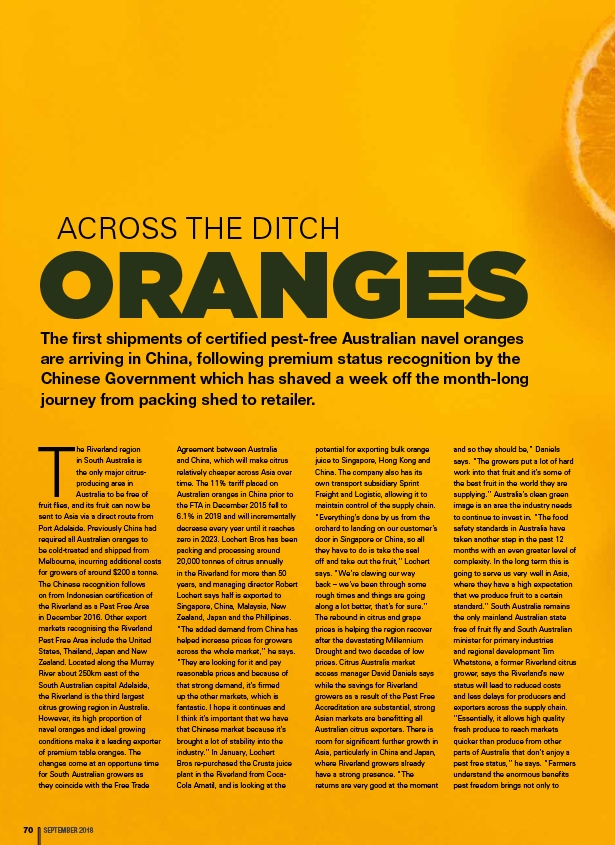
ACROSS THE DITCH
ORANGES
The first shipments of certified pest-free Australian navel oranges
are arriving in China, following premium status recognition by the
Chinese Government which has shaved a week off the month-long
journey from packing shed to retailer.
The Riverland region
in South Australia is
the only major citrusproducing
area in
Australia to be free of
fruit flies, and its fruit can now be
sent to Asia via a direct route from
Port Adelaide. Previously China had
required all Australian oranges to
be cold-treated and shipped from
Melbourne, incurring additional costs
for growers of around $200 a tonne.
The Chinese recognition follows
on from Indonesian certification of
the Riverland as a Pest Free Area
in December 2016. Other export
markets recognising the Riverland
Pest Free Area include the United
States, Thailand, Japan and New
Zealand. Located along the Murray
River about 250km east of the
South Australian capital Adelaide,
the Riverland is the third largest
citrus growing region in Australia.
However, its high proportion of
navel oranges and ideal growing
conditions make it a leading exporter
of premium table oranges. The
changes come at an opportune time
for South Australian growers as
they coincide with the Free Trade
Agreement between Australia
and China, which will make citrus
relatively cheaper across Asia over
time. The 11% tariff placed on
Australian oranges in China prior to
the FTA in December 2015 fell to
6.1% in 2018 and will incrementally
decrease every year until it reaches
zero in 2023. Lochert Bros has been
packing and processing around
20,000 tonnes of citrus annually
in the Riverland for more than 50
years, and managing director Robert
Lochert says half is exported to
Singapore, China, Malaysia, New
Zealand, Japan and the Phillipines.
“The added demand from China has
helped increase prices for growers
across the whole market,” he says.
“They are looking for it and pay
reasonable prices and because of
that strong demand, it’s firmed
up the other markets, which is
fantastic. I hope it continues and
I think it’s important that we have
that Chinese market because it’s
brought a lot of stability into the
industry.” In January, Lochert
Bros re-purchased the Crusta juice
plant in the Riverland from Coca-
Cola Amatil, and is looking at the
potential for exporting bulk orange
juice to Singapore, Hong Kong and
China. The company also has its
own transport subsidiary Sprint
Freight and Logistic, allowing it to
maintain control of the supply chain.
“Everything’s done by us from the
orchard to landing on our customer’s
door in Singapore or China, so all
they have to do is take the seal
off and take out the fruit,” Lochert
says. “We’re clawing our way
back – we’ve been through some
rough times and things are going
along a lot better, that’s for sure.”
The rebound in citrus and grape
prices is helping the region recover
after the devastating Millennium
Drought and two decades of low
prices. Citrus Australia market
access manager David Daniels says
while the savings for Riverland
growers as a result of the Pest Free
Accreditation are substantial, strong
Asian markets are benefitting all
Australian citrus exporters. There is
room for significant further growth in
Asia, particularly in China and Japan,
where Riverland growers already
have a strong presence. “The
returns are very good at the moment
and so they should be,” Daniels
says. “The growers put a lot of hard
work into that fruit and it’s some of
the best fruit in the world they are
supplying.” Australia’s clean green
image is an area the industry needs
to continue to invest in. “The food
safety standards in Australia have
taken another step in the past 12
months with an even greater level of
complexity. In the long term this is
going to serve us very well in Asia,
where they have a high expectation
that we produce fruit to a certain
standard.” South Australia remains
the only mainland Australian state
free of fruit fly and South Australian
minister for primary industries
and regional development Tim
Whetstone, a former Riverland citrus
grower, says the Riverland’s new
status will lead to reduced costs
and less delays for producers and
exporters across the supply chain.
“Essentially, it allows high quality
fresh produce to reach markets
quicker than produce from other
parts of Australia that don’t enjoy a
pest free status,” he says. “Farmers
understand the enormous benefits
pest freedom brings not only to
70 SEPTEMBER 2018